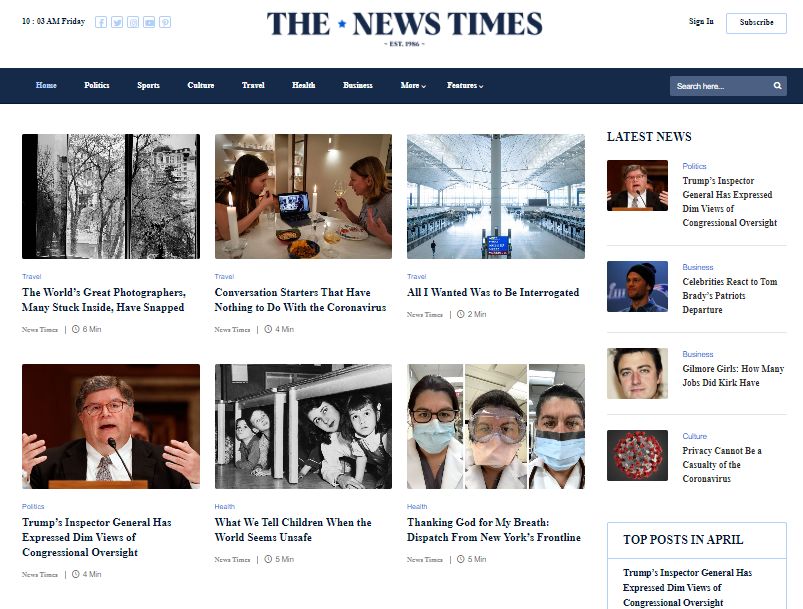FAQs About stnews.live Explained
The Importance of Fact-Checking on the planet of News Online
The frequency of false information in today's online news landscape has actually gotten to alarming degrees. Fact-checking organizations play an essential duty in counteracting this fad. They confirm cases and enhance the reliability of journalism. The efficiency of these organizations typically pivots on their approaches and public assumption. As target markets navigate this complicated environment, the implications of their findings may shape the future of news usage and trust fund. What does this mean for the honesty of info relocating forward?

The Surge of Misinformation in the Digital Age
Just how has the introduction of electronic technology added to the spread of misinformation? The fast growth of the web and social media platforms has actually helped with the circulation of information at an extraordinary rate. Customers can share write-ups, videos, and viewpoints with a mere click, usually without verifying the web content's precision. Algorithms prioritize spectacular or emotionally billed material, leading to an expansion of misleading narratives that record interest.
In addition, the anonymity paid for by digital systems allows people to spread out false information without responsibility (stnews.live). Misinformation flourishes in echo chambers, where individuals are exposed mostly to point of views that reinforce their ideas, better setting falsehoods. The saturation of info can overwhelm customers, making it challenging to recognize reputable sources from unreliable ones. Subsequently, misinformation has actually become a prevalent concern in the digital landscape, affecting popular opinion and trust fund in genuine news resources
The Duty of Fact-Checking Organizations
Fact-checking companies play a vital role in improving the reputation of journalism by verifying cases made in report. Their efforts are important in combating misinformation, making certain that exact information prevails in the digital landscape. By holding media electrical outlets liable, these organizations contribute considerably to educated public discourse.
Enhancing Reliability in Journalism
While misinformation multiplies in the electronic age, fact-checking companies play a necessary function in boosting the integrity of journalism. These organizations carefully verify cases made in newspaper article, public declarations, and social media sites blog posts, ensuring that information shared to the public is precise and credible. By offering independent evaluations, they function as a crucial source for reporters, helping them keep high requirements of integrity. Additionally, their efforts advertise openness in media, fostering public trust fund. As audiences become progressively critical, the existence of credible fact-checking entities can identify trusted news resources from those that might spread out fallacies. Inevitably, the commitment of fact-checking companies to copyright reliability is essential for the health and wellness of democratic discussion.
Combating False Information Efficiently
As misinformation continues to spread rapidly throughout electronic platforms, the function of fact-checking companies comes to be progressively vital in the battle for precise details. These organizations function as guard dogs, inspecting cases made by public figures and media outlets to ensure liability. By employing strenuous research study methods and specialist evaluation, they confirm truths and make clear deceptive stories. Their searchings for are distributed with numerous networks, enlightening the general public and promoting important thinking. On top of that, partnerships with social media sites platforms enhance their reach, enabling for timely flagging of false information. As electronic literacy grows, the influence of fact-checking organizations is vital in equipping target markets to recognize truth from fallacy, eventually adding to a more enlightened culture.
Just How Misinformation Affects Public Perception
False information significantly threatens trust in media, leading audiences to doubt the reputation of news resources. Consequently, people commonly are attracted in the direction of outlets that enhance their present beliefs, adding to the polarization of opinions. This vibrant produces a fragmented information landscape, where shared understanding comes to be significantly difficult to achieve.
Trust in Media

Count on media has actually ended up being progressively delicate in the digital age, where the rapid spread of incorrect info can alter public assumption. As misinformation proliferates throughout social networks and online systems, audiences often discover it testing to determine credible sources from undependable ones. This uncertainty fosters hesitation, leading several people to question the intentions behind news coverage. Trust fund in established media electrical outlets has reduced, as consumers significantly turn to alternate resources that may do not have strenuous editorial requirements. This disintegration of trust not only influences individual beliefs yet also weakens the cumulative ability to participate in notified conversations. Inevitably, the stability of journalism is at risk, highlighting the important requirement for effective fact-checking to bring back self-confidence in the media landscape.

Polarization of Point of views
The enhancing apprehension towards conventional media has added to an expanding polarization of viewpoints amongst the general public. False information, commonly shared through social media and on the internet platforms, plays a significant role in shaping distinctive ideological divides. Individuals regularly seek info that straightens with their pre-existing ideas, enhancing their point of views while disregarding opposing perspectives. This resemble chamber impact intensifies divisions, resulting in a fragmented public discourse where consensus ends up being progressively evasive. Additionally, sensationalized narratives grow in this atmosphere, even more skewing public understanding and promoting distrust in legitimate sources. As polarization rises, the necessity for effective fact-checking comes to be vital to connect voids and advertise educated conversations, eventually ensuring a much more cohesive culture with the ability of navigating complicated problems.
Techniques for Reliable Fact-Checking
Effective fact-checking relies upon a systematic strategy that includes thorough research, confirmation of sources, and essential analysis of insurance claims. A foundational technique is cross-referencing information from several trustworthy resources to verify its accuracy. Fact-checkers often use specialized data sources and archives to trace the beginning of certain declarations, making sure that the reported details lines up with recorded evidence.
Another crucial technique includes looking at the context in which claims are provided. Deceptive info can arise from out-of-context quotations or careful information use. By examining the broader narrative, fact-checkers can identify potential biases or false impressions.
Engaging with professionals in relevant fields can offer quality and insight that boosts the fact-checking process. This partnership can uncover nuances that laypeople may neglect - stnews.live. Inevitably, a regimented approach integrating these strategies fosters a more enlightened public, improving the reliability of information shared in the electronic age
The Influence of Social Media on News Usage
Just how has social networks changed the method individuals eat news? The appearance of systems like Facebook, Twitter, and Instagram has especially modified news usage patterns. News is now distributed quickly, enabling users to access real-time updates and involve with content through likes, shares, and comments. This immediacy has actually promoted a preference for bite-sized information, typically at the cost see post of thorough analysis.
Moreover, social media makes it possible for personalized news feeds, where formulas curate content based on customer preferences, developing echo chambers that might limit direct exposure to diverse perspectives. The function of standard news outlets has reduced as people progressively count on peer referrals and trending subjects. The trustworthiness of details is typically over here compromised, as sensationalism can overshadow valid reporting. Generally, social media has actually improved news consumption, emphasizing rate and personalization while challenging the standards of journalistic honesty.
Empowering Target Markets to Determine Trusted Sources

Additionally, examining the authorship and organizational history of newspaper article can reveal possible biases. Cross-referencing information throughout numerous trusted outlets further enhances the verification process. Making use of digital devices, such as web browser extensions that rate the reputation of web sites, can also assist in recognizing credible info. By actively engaging with these sources and growing an important mindset, target markets can much better equip themselves to discern reputable news sources, ultimately cultivating an extra educated culture amidst the complexities these days's media setting.
The Future of Journalism and Fact-Checking
As the media landscape advances, the future of journalism and fact-checking faces both challenges and opportunities. The increase of digital platforms has actually equalized information dissemination, permitting varied voices to arise. However, this has additionally resulted in the spreading of misinformation, requiring robust fact-checking systems. Reporters will increasingly rely upon technology, consisting of AI devices, to verify realities quickly and effectively.
Collaboration between wire service and fact-checking entities is expected to enhance trustworthiness and openness. Audience engagement will play a vital function, as informed visitors end up being considerable companions in recognizing reliable web content.
The demand for liability and precision is most likely to expand, pressing reporters to promote high criteria in their coverage. Inevitably, the future of journalism might pivot on its capacity to adapt to technical improvements while keeping journalistic stability, making sure that fact-checking continues to be a foundation of legitimate news.
Frequently Asked Questions
Just How Can I Report False Information I Run Into Online?
To report misinformation experienced online, people can make use of platform-specific reporting devices, supply clear evidence, and share the information with fact-checking organizations. Engaging with community discussions can additionally aid raise understanding regarding the misinformation.
What Are Common Signs of False Information in News Articles?
Typical indications of misinformation find out here now in news short articles consist of mind-blowing headings, absence of reliable resources, psychological language, inconsistent facts, and absence of writer qualifications. Visitors ought to seriously examine web content for these signs to recognize accuracy.
Exactly How Do Fact-Checkers Verify Sources?
Fact-checkers confirm sources by cross-referencing details with legitimate databases, consulting experts, and examining the original context of cases. They likewise analyze the dependability of the sources, making sure accurate and trustworthy information for public usage.
What Lawsuits Can Be Taken Versus Misinformation?
Lawful activities against misinformation may consist of defamation claims, cease-and-desist orders, and regulatory charges. Targets can seek remedy through civil courts, while some territories enforce penalties or sanctions on systems sharing false information.
Exist Apps for Fact-Checking News On-The-Go?
Numerous apps exist for fact-checking news on-the-go, including Snopes, FactCheck.org, and PolitiFact. These applications help users verify claims quickly, promoting educated decision-making and promoting a more discerning approach to consuming news in real-time.